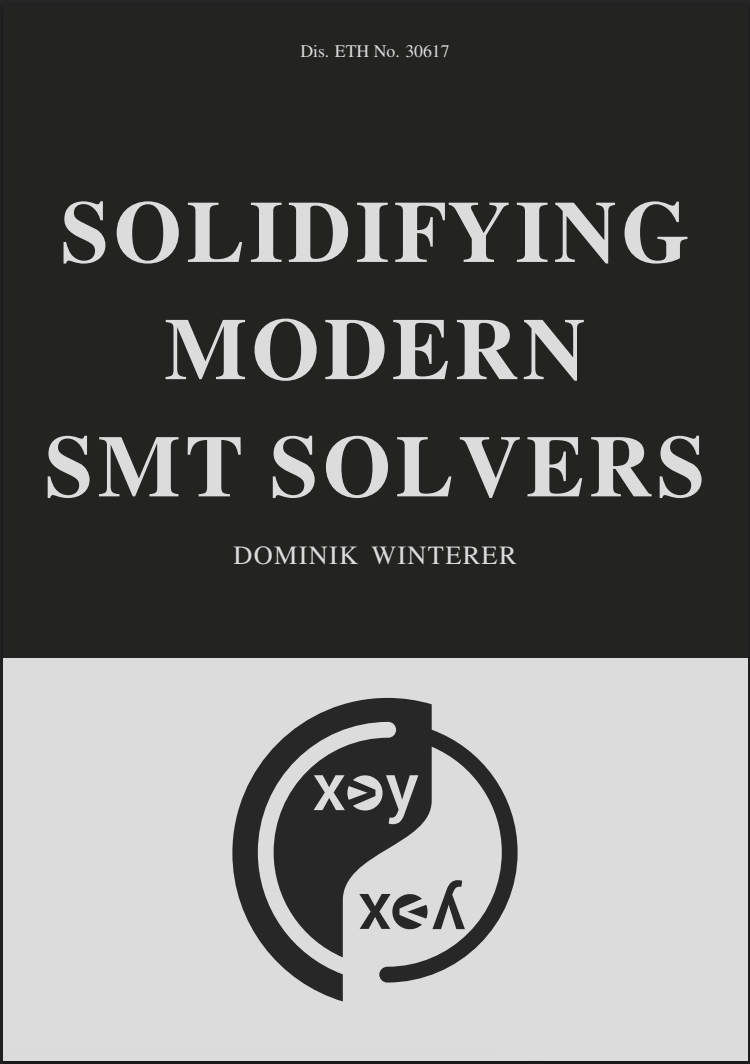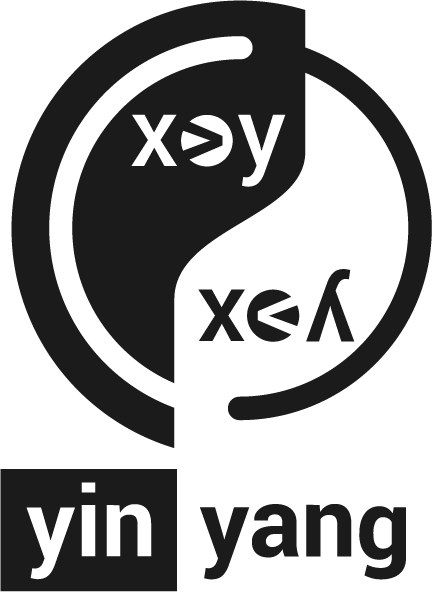
Dominik Winterer
Assistant Professor (Lecturer)
Formal Methods Engineering Lab
University of Manchester
Kilburn Building, Oxford Rd, M13, UK
Office: Kilburn 2.81
Email: dominik.winterer@manchester.ac.uk
About
I am an Assistant Professor (Lecturer) at the University of Manchester, where I lead the Formal Methods Engineering Lab. I completed my Ph.D. and PostDoc at ETH Zurich, and before that, my MSc at the University of Freiburg in Germany. I also did research internships at the Automated Reasoning Group at AWS and at IBM Research in the United States.My research aims to establish Formal Methods Engineering—a new discipline focused on making Formal Methods, mathematically rigorous methods for bug prevention, more practical and widely adopted. As a first step, I led one of the largest academic bug-hunting campaigns to date, uncovering over 1,800 bugs and enabling more than 1,300 fixes in SMT solvers, which are foundational tools in Formal Methods.
News
- Dec 2025 Excited to be chairing the Student Research Competition at ASE ‘26!
- Aug 2025 Excited to be invited to the Program Committee of PLDI ‘26!
- Aug 2025 I was invited to speak at Cornell & UT Austin’s joint SE seminar!
- Jul 2025 I was a guest in the Disseminate: The Computer Science Research Podcast by Jack Waudby!
- Jul 2025 Excited to be on the Program Committee of Euro S&P ‘26!
- May 2025 🎉 I am joining the University of Manchester as a Lecturer (Assistant Professor) in September. I’ll be leading the Formal Methods Engineering Lab. I’m hiring!
- Mar 2025 Excited to be on the Program Committee of FUZZING ‘25!
- Feb 2025 Excited to be on the Program Committee of ASE ‘25!
Dissertation
Solidifying Modern SMT Solvers
Satisfiability Modulo Theory (SMT) solvers are among the most powerful and mature formal methods. They are foundational in software research and industry—for example, AWS uses them to verify cloud services. SMT solvers solve NP-hard problems and build trust through proof, making correctness and performance crucial, especially in safety- and security-critical domains. Though long trusted, SMT solvers’ reliability had not been thoroughly tested. This thesis challenges that trust through five approaches to improve solver correctness and performance The first, Semantic Fusion, validates SMT solver correctness and revealed dozens of soundness bugs in Z3 and CVC4. Next, Type-Aware Operator Mutation, a simple but highly effective method, uncovered 1,254 bugs, including soundness bugs across nearly all theories. To improve upon this, Generative Type-Aware Mutation found 322 more bugs, including long-standing ones in CVC4. Janus targets incompleteness bugs, while Grammar-based Enumeration (ET) tackles correctness and performance. ET also helps track SMT solver evolution. Across five years, we found 1,825 unique bugs (483 soundness), with 1,333 fixed. This thesis has advanced the hardening of formal methods.
Research Projects
Project Yin-Yang for SMT Solver Testing
Satisfiability Modulo Theory (SMT) solvers are foundational tools for many subareas of computer science, including formal verification, programming languages, and software engineering. Their reliability and robustness are crucial, especially for the safety-critical domains. However, effectively validating SMT solvers has been a longstanding challenge. The goal of Project Yin-Yang is to develop novel, effective, practical methods and techniques to help make SMT solvers more reliable, powerful, and usable.
Enumerative Testing
The enumerative testing framework ET exhaustively enumerates test cases based on a context-free grammar. It will generate small test cases first exploiting the small-scope hypothesis which states that “most bugs in software trigger on small inputs”. Testing with small test cases has many unique benefits: tiny bug triggers, bounded guarantees, the ability to measure the evolution of a software.
Selected Publications
-
Validating SMT Solvers for Correctness and Performance via Grammar-based Enumeration
Dominik Winterer, Zhendong Su
In Proceedings of SPLASH/OOPSLA 2024⭐ Bounded Validation of the SMT Solvers Z3 and cvc5
-
Finding and Understanding Incompleteness Bugs in SMT Solvers
Mauro Bringolf, Dominik Winterer, Zhendong Su
In Proceedings of ASE 2022 [slides / tool] -
Generative Type-Aware Mutation for Testing SMT Solvers



Jiwon Park*, Dominik Winterer*, Chengyu Zhang, Zhendong Su
In Proceedings of SPLASH/OOPSLA 2021 [slides / video abstract]
* Both authors contributed equally. -
On the Unusual Effectiveness of Type-Aware Mutations for Testing SMT Solvers
Dominik Winterer*, Chengyu Zhang*, Zhendong Su
In Proceedings of SPLASH/OOPSLA 2020 [slides / video abstract]
* Both authors contributed equally.⭐ 1,000+ bugs in the SMT Solvers Z3 and CVC4
-
Validating SMT Solvers via Semantic Fusion
Dominik Winterer*, Chengyu Zhang*, Zhendong Su
In Proceedings of PLDI 2020 [slides / video abstract]
* Both authors contributed equally.🏆 ACM Distinguished Paper Award⭐ Invited to ACM TOPLAS Special Issue
Awards and Grants
- Heidelberg Laureate Forum 2022
- Amazon Research Award Fall 2021 (Co-PI)
- Google Open Source Peers Bonus 2021 (for yinyang)
- Invited to ACM TOPLAS Special Issue
- ACM Distinguished Paper Award (PLDI '20)
- IJCAI '16 Travel Grant Award
Supervised Students
University of Manchester
- Andrei Zhukov (external MSc. thesis, ongoing)
ETH Zurich
- Pasquale Jordan (MSc. thesis, completed)
- Andrei Zhukov (Practical work, completed)
- Thea Kjeldsmark (Intern, completed)
- Lu Maltsis (BSc. thesis, completed)
-
Violet Szabo; (Intern, completed)
- POPL '24 SRC paper
- first author on work on compilation hardness of PLs [preprint]
- Marc Andriu Carigiet (BSc. thesis, completed)
- Michael Mörschell (BSc. thesis, completed) → MSc. student @ETH Zurich
-
Jiwon Park (BSc. thesis + Internship, completed) → Ph.D. student @UC Berkeley
- 2nd place@FSE '21 SRC
- Co-first author of OOPSLA '21 paper
-
Mauro Bringolf (MSc. thesis, completed) → Software Engineer @
University of St. GallenDigitec- First author of ASE'22 paper
-
Dylan J Wolff (MSc. thesis, completed) → Ph.D. student @National University of Singapore
- POPL '21 SRC paper
- Altin Alickaj (Practical work, completed) → Oracle labs
Invited Talks
-
Formal Methods Engineering: Toward Reliable Software Engineering
MPI-SP Sparkling Series, Apr 2025
USI Lugano Software Seminar Series, Feb 2025 -
Solidifying SMT Solvers through Automated Testing Techniques
Harvard PL Seminar, Mar 2024
UPenn, PLClub, Feb 2024
UC Berkeley, Programming Systems Seminar, Jan 2024 -
Directed Testing of a String Solver
Amazon Webservices, Feb 2024 -
Finding 1,700+ Bugs in the SMT Solvers Z3 and CVC5
UCSC LSD Seminar (virtual), Feb 2023
USC Software Seminar (virtual), Nov 2022
KIT Research Seminar Formal Methods, Sep 2022
Paderborn University, Jun 2022
CEA List at Paris Saclay (virtual), Feb 2021
Service
- Artifact Evaluation Co-Chair: ISSTA 2024
- Co-organizer of SMT-COMP (since 2025)
- PC Member: Euro S&P '26, CAV '25, ASE '25, ICSE 2024 (Demo track), AAAI '20, AAAI '21, SYNASC '22, MET '23
- Journal Reviewer: TOSEM '24, JAIR '17, TSE '21
- Reviewer/Judge Student Research Competition: OOPSLA '21
- Artifact Evaluation Committee Member: ISSTA '21, POPL '21, PLDI '22
- SIGPLAN-M Longterm mentoring (since Oct 2021)
Teaching
@ETH Zurich- Algorithms and Data structures, Spring 2024
- Formal Methods and Functional Programming, Spring 2022
- Software Engineering, Spring 2021 (Head TA)
- Data Modelling and Databases, Spring 2020, 2023
- Research Topics in Software Engineering, Spring 2020, 2021, 2022, Fall 2020
- Compiler Design, Fall 2019, 2020, 2021 (Head TA)
- Decision Procedures, Fall 2018
- Software Engineering, Fall 2018
- Model Checking, Fall 2016
- Theoretical Computer Science, Fall 2016






